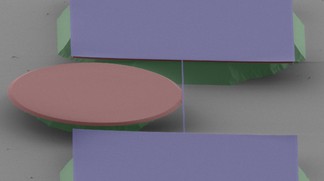EPFL scientists have synthesized a highly accurate and fast opto-mechanical measurement system which can be integrated within a silicon chip. The domain of sensors and atomic force microscopy will advance through this new technology.
 Opto-mechanical measurement system
Opto-mechanical measurement system
Resonators can detect infinitesimal quantities of matter within the atmosphere.
EPFL physicist Tobias Kippenberg, together with Pierre Verlot and Emanuel Gavartin, has made effort in creating more compact, accurate and sensitive sensors. The journal Nature Nanotechnology includes a report publication of the device that can be integrated on board a single chip.
Researchers are trying to reduce the size of resonators. Reduction in sensor’s size will promote its sensitivity. By partnering with EPFL’s Center for Micronanotechnology (CMi), Gavartin developed a new device using a string of minimal length (a few hundred nm in diameter). This device ensures increased sensitive and efficient operation at room temperature.
In order to evaluate the string’s vibrations, a laser beam focused on to a tiny glass disk was employed by the scientists. The beam circulates 1,000x in just 2 ns before leaving the disk. The string is kept mounted on this photon track, where the beam gets excited by to the vibration of the string. By comparing the entry and exit of the laser’s wavelength in the disk, the string’s movement can be inferred.
“Brownian motion” creates random vibration on the string thereby leading to retarded measurements. This however remained as a challenge for the scientists.
As ultra-cold temperatures impede Brownian motion, cooling the system with helium will help solve the limitation. But the EPFL team developed a technique that hampered the Brownian motion, maintaining the system to stay at room temperature. This virtual cooling system involves a “probe” (first laser) that identifies the string’s movements, followed by real-time signal processing that can modulate the “control” (second laser) incorporated within the disk. By creating a counterforce on the string, it will counteract the Brownian effect.
Based on this innovative technique, the time between measurements were decreased by 32-fold, with efficient operation at just 20°C, thereby achieving unique precision.